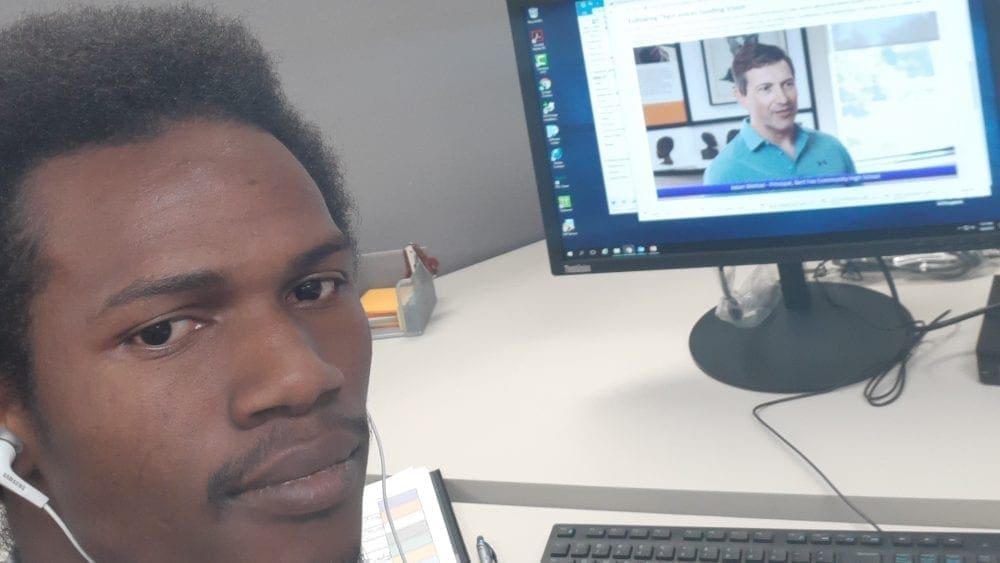Sierra Leone, a small country in West Africa with approximately 7 million people, recorded its first COVID-19 case on March 31. COVID-19 is the most recent in a series of natural and artificial disasters Sierra Leone has faced in in recent years – a civil conflict (1991-2002), cholera in 2012, Ebola in 2014, flooding and a mudslide in 2017. In the education sector, lessons learned from past disasters, especially the Ebola epidemic, have been applied quickly in response to COVID-19.
After the government closed the schools and shut down the country at the end of March, administrative and management staff within the Education sector were challenged to think critically to identify best practices to get our students learning despite the COVID-19 situation. We identified some lessons from the Ebola epidemic which can be applied to ensure learning during the COVID-19 pandemic.
Firstly, we ensured that all COVID-19 safety measures (wearing a face mask, hand-washing, social distancing and stopping bodily contact) are practiced. Safety measures were also required during the Ebola epidemic, although wearing a face mask is new with COVID-19. Secondly, radio teaching programs for all levels were designed and delivered across multiple radio stations to reach all students within the country. The same as during the Ebola epidemic, radio was chosen as the medium of teaching because there is limited access to internet in the country so online courses would not be viable. Teachers and head of schools were provided with psychosocial support and girl’s safety training. Development partners were tasked with numerous community engagement activities to support and facilitate the learning process. Programs were put int place to support family engagement in student learning and gender based community activities were created to protect girls from harm/abuse. We hope these initiatives will minimize the damage of COVID-19 on our students!
Before the COVID-19 crisis struck, getting students back up to speed after the Ebola epidemic had been one of the government’s objectives. An assessment of student performance completed in 2018 showed that the country was five years behind. The recently elected government made education a top priority and the budget allocation for the sector was significantly increased. A new curriculum called the Lesson Plan Manual was adopted to replace the Accelerated Learning Manual.
As I transitioned from completing my Masters of Public Administration in Canada to working as the District Education Support Officer in one of the regions of the country, I constantly wondered how we could ensure that the gap resulting from the Ebola epidemic would be covered. Unfortunately, as we worked towards getting that remedied, we were faced with a new challenge—the COVID-19 pandemic.
In my role of coordinating government efforts to open schools and ensure safety of students and teachers, I’ve been able to put into action important lessons learnt from my courses such as development and management of budgets, managing human and capital resources, developing policy recommendations based on field data and utilizing contemporary software to manage educational database.
Sierra Leone is a resilient nation. It has worked hard to ensure the pandemic is put under control even though it’s a country with lots of obstacles in almost every sector. In the education sector, we hope that the measures that have been implemented will allow students to get back up to speed when schools finally re-open as usual.
Sulaiman Jalloh is an African Leaders of Tomorrow Scholar (2018 – 2019). He graduated with a Master of Public Administration from the University of Regina in December 2019. He is a District Education Officer with the Ministry of Basic and Senior Secondary Education in Sierra Leone. For the past two months, he has been posted in the rural areas of the country to coordinate government efforts to open schools and ensure student safety. The views expressed in this post are those of the author.
The ALT Scholarship Program is funded by the Government of Canada through Global Affairs Canada and by the Mastercard Foundation. It is managed by CBIE in partnership with the Institute of Public Administration of Canada and in collaboration with the African Association of Public Administration and Management and the Canadian Association of Programs in Public Administration.



Comments are closed.